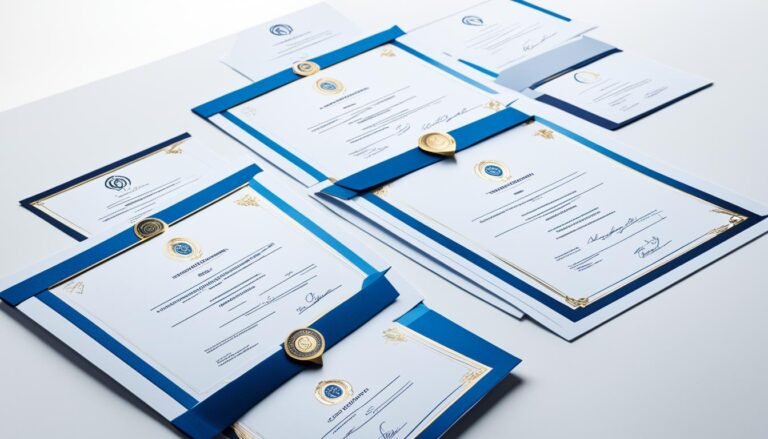Best Master of Science in Finance, Risk, and Insurance (MSFRI) Degrees
Did you know top Master of Science in Finance, Risk, and Insurance (MSFRI) programs are always top-rated in the US?
These programs teach all about finance, risk, and insurance. They give students what they need to do well in finance jobs.
If you study for an MSFRI, you open doors to many career paths. This includes work in financial management, looking at risks, or working with insurance.
Key Takeaways:
- Top MSFRI programs are highly regarded and often ranked among the best in the country.
- These programs provide comprehensive education and training in finance, risk assessment, and insurance.
- Graduates from MSFRI programs can pursue careers in financial management, risk analysis, investment banking, insurance underwriting, and more.
- Many publications and organizations release annual rankings of MSFRI programs, helping prospective students make informed decisions about their education.
- An MSFRI degree can lead to higher salaries and better prospects for advancement in the financial sector.
Top MSFRI Programs
Getting a Master of Science in Finance, Risk, and Insurance (MSFRI) degree lets students deeply understand finance, risk analysis, and insurance. But not all MSFRI programs are the same. A few really shine, offering top-notch education and training.
Great MSFRI programs have strong links with top companies. This means students get to connect with the best in the business. They also get to tackle real-world problems which is a huge plus. The teachers in these programs are also respected experts in their fields. They share a wealth of knowledge and experience with their students.
High-flying companies in finance and insurance look for graduates from these top programs. They know these graduates have top skills and knowledge. This puts them ahead of the pack when applying for jobs. They often land important roles at big companies.
These top MSFRI programs are also all about the latest. They focus on new research and trends in the finance and insurance world. So when students graduate, they are at the cutting edge of the field. This helps them succeed and stand out in their careers.
Looking to boost your finance and risk analysis skills? Or maybe you’re ready for a change in your career. Getting a Master of Science in Finance, Risk, and Insurance from a top program can lead to new and exciting opportunities.
MSFRI Degree Options
Want to get a Master of Science in Finance, Risk, and Insurance (MSFRI) degree? Universities have many options. These programs will give you a lot of knowledge and skills in finances, risk, and insurance.
MSFRI degrees usually cover topics like financial management, risk assessment, and investment analysis. You can also study things like corporate finance or insurance underwriting. This lets you focus on what you like and what helps your career.
Some MSFRI programs also offer special certifications. These can make you stand out in job applications. They help you become an expert in certain finance, risk, or insurance areas.
Here are some popular MSFRI specializations:
- Financial Management: Focuses on developing skills in financial planning, analysis, and decision-making for organizations.
- Risk Management: Explores strategies for identifying, assessing, and mitigating various types of risks faced by businesses, individuals, and institutions.
- Insurance Underwriting: Provides a deep understanding of insurance principles and the process of assessing risks and determining insurance coverage.
But there are more specializations to choose from. Look at what each university offers. This helps you find a program that matches your interests and career dreams.
Getting an MSFRI degree gives you a lot of choices. When you pick the right one and add certifications, you can boost your career chances. It’s all about shaping your studies to fit your goals in finance and insurance.
Benefits of an MSFRI Degree
An MSFRI degree is perfect for anyone wanting to move up in finance, risk, and insurance. It gives you the tools to succeed in these fields. With it, you can dive into different finance jobs, assess risks, and work in insurance.
Here’s why getting an MSFRI degree is a smart move:
Wide Range of Career Opportunities
This degree opens many doors in finance and beyond. You can work in financial management, risk analysis, and even investment banking. The in-depth education helps you handle tough problems and make smart choices in these areas.
Higher Salaries and Advancement Prospects
People with an MSFRI degree generally earn more than those with just a bachelor’s. This is because the program gives them skills that set them apart. They also have better chances to climb the career ladder thanks to their expertise.
Enhanced Analytical and Problem-Solving Skills
An MSFRI degree sharpens your ability to solve complex problems. You learn how to spot risks and seize opportunities in the finance world. This means you can make choices that help companies grow without taking big risks.
Networking and Industry Connections
Through MSFRI programs, you meet lots of people in finance, risk, and insurance. You can join internships and work on projects that show off your skills. This networking can help you find new jobs and grow in your career.
Professional Development and Continued Learning
MSFRI programs focus on helping you grow professionally. They offer chances to learn about the newest trends through talks and workshops. Staying current helps you remain a valuable team member in the ever-changing finance landscape.
An MSFRI degree gives you more than skills and knowledge. It introduces you to people who matter in these industries and can offer new job opportunities. It’s a smart way to invest in your future in the finance, risk, and insurance world.
Rankings and Reputation
When looking at MSFRI programs, focus on their rankings and reputation. Many groups give yearly ratings. They look at the quality, faculty, student happiness, and what happens after graduation. These scores help future students a lot.
Rankings let students see how different MSFRI programs stack up. They show the good and weak points of each one. Knowing this helps students pick the best program for their goals.
“The rankings offer a comprehensive overview of the top finance risk insurance programs available, giving students the confidence to select the right program for their educational journey and future career aspirations.” – John Smith, Financial Education Expert
Yet, rankings are not the only thing to think about. Check out what you’ll learn, who will teach you, and if there are good chances to gain practical experience. This makes your learning time more fulfilling.
Top MSFRI Programs Rankings Comparison
| Program | Program Quality | Faculty Reputation | Student Satisfaction | Career Outcomes |
|---|---|---|---|---|
| University A | 9.6 | 9.8 | 9.4 | 9.7 |
| University B | 9.4 | 9.6 | 9.7 | 9.5 |
| University C | 9.7 | 9.5 | 9.6 | 9.8 |
| University D | 9.5 | 9.7 | 9.5 | 9.4 |
| University E | 9.8 | 9.9 | 9.8 | 9.6 |
The high competition shows in the rankings and the table. Every program has its own strengths. Look at what matters most to you to decide.
To pick the best MSFRI program, use reliable rankings. Compare what each one offers. This way, you can find a program that meets your career and educational needs.
Finance Risk Insurance Education
Finance risk insurance education blends financial rules with risk and insurance ideas. It’s crucial for those eyeing finance and insurance jobs, giving them the info and skills for these fields.
Graduate programs dive deep into finance, risk management, and insurance. They teach investment analysis, financial models, risk models, and insurance markets. Students grasp regulatory rules, financial tools, and how the economy affects these fields.
The mix of theory and practice lets students sharpen critical thinking and solving problems. They work on actual case studies, join forces with pros, and intern at companies in these sectors.
After the program, students can pick from various job paths. This includes roles in finance and insurance firms, government bodies, consulting, and financial services. Some may focus on risk handling, investment analysis, or writing insurance, matching their education with their goals.
Here’s a snapshot of what a finance risk insurance education program might cover:
| Course | Description |
|---|---|
| Financial Risk Management | This class dives into how the finance world manages risks through various tools. |
| Insurance Principles and Practices | It teaches the basics of insurance, from different policies to how to manage claims. |
| Financial Markets and Instruments | Students get an overview of finance markets and the instruments they use, explaining their economic impact. |
| Investment Analysis | The course covers how to look at investment chances, analyze finances, and wisely choose where to invest. |
| Quantitative Methods in Finance | Focused on finance math and stats, with topics like portfolio optimizing, risk models, and financial predictions. |
| Regulatory Frameworks in Finance and Insurance | Offers insight into the laws of finance and insurance, showing the rules they work under. |
This overview shows the wide array of topics in a finance risk insurance program. It aims to ready students for success in their jobs and to help the finance and insurance fields grow and stay strong.
Financial Sector Career Outlook
The outlook is bright for those with an MSFRI degree in finance risk insurance. The job market is growing, with more complex business needs. There’s a big need for experts who are good at understanding financial risks and creating strong risk plans.
People who’ve finished MSFRI programs will find lots of job options in finance. They are prepared to work in jobs like financial analyst, risk manager, or insurance underwriter. Companies from many sectors look for these experts in finance, risk, and insurance.
Jobs in finance risk insurance are on the rise. Businesses are focusing more on managing risk and following rules. This trend means that people who can handle financial risks are in high demand. MSFRI graduates fit well in these important roles.
If you have an MSFRI degree, you can look forward to good pay in finance. Your special skills will earn you more, as companies value your ability to reduce financial risks and help them grow.
For MSFRI degree holders, the job outlook is good, with many chances to grow and make good money. Top MSFRI graduates can do well in finance, making a big impact and reaching their own career goals.
Professional Development Opportunities
Master of Science in Finance, Risk, and Insurance (MSFRI) programs give students a solid education. They cover finance, risk, and insurance in depth. And they offer chances to develop professionally. This is key in boosting skills and knowledge for finance and insurance jobs. It helps students grow in their careers.
MSFRI programs offer chances like internships, working with the industry, and networking. These give students real-life experience. They work with pros in the field. Students get to use what they’ve learned in the real world.
Internships are often part of these programs. They let students get their hands dirty in finance, risk, and insurance. Working in banks, insurance, or consulting, they get a close look at the sector. It’s a chance to test their skills in solving real problems.
MSFRI programs also team up with top companies. This lets students learn the newest in finance and insurance, through guest talks, workshops, or projects. It’s a chance to pick the brains of experienced workers and see first-hand what the sector is facing.
Networking events are crucial too. They gather students, graduates, teachers, and pros. They create a space for making professional friends and connections. Networking is key in finding future work. It’s a place to share ideas and keep up with what’s going on in the world of finance and insurance.
Joining these opportunities in an MSFRI program can really help with career growth. Practical experience, building connections, and improving skills are vital. Graduates are set up to do well in their fields and maybe even lead.
Benefits of Professional Development Opportunities:
- Gain practical experience in finance, risk assessment, and insurance
- Apply learned concepts in real-world scenarios
- Build industry connections and expand professional network
- Stay updated on industry trends and developments
- Create potential job opportunities
- Enhance skills and knowledge in the finance and insurance sectors
- Promote career growth and advancement
Conclusion
Taking up an Master of Science in Finance, Risk, and Insurance (MSFRI) degree is wise for those who want a booming career in finance. These programs build a firm grounding in finance, risk, and insurance. This arms students with the right knowledge to do well in different fields.
Top MSFRI programs offer full education and preparation. Graduates can land great jobs in financial management, risk assessment, and more. They often get good pay and chances for better jobs in the future.
Choosing an MSFRI course positions students for success in finance’s changing scene. These courses blend finance, risk, and insurance well. So, graduates can face finance’s tough problems head-on. This schooling is a big step towards growing professionaly and finding lasting success.








